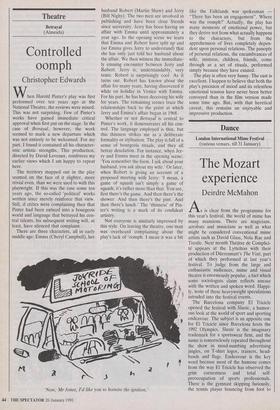Theatre
Betrayal (Almeida)
Controlled oomph
Christopher Edwards
When Harold Pinter's play was first performed over ten years ago at the National Theatre, the reviews were mixed. This was not surprising. Few of Pinter's works have gained immediate critical approval when first put on the stage. In the case of Betrayal, however, the work seemed to mark a new departure which was not entirely to be welcomed. For my part, I found it contained all his character- istic artistic strengths. This production, directed by David Leveaux, reinforces my earlier views which I am happy to repeat here.
The territory mapped out in the play seemed on the face of it slighter, more trivial even, than we were used to with this playwright. If this was the case some ten years ago, the so-called 'political' works written since merely reinforce that view. Still, if critics were complaining then that Pinter had been enticed into a bourgeois world and language that betrayed his cen- tral talents, his subsequent writing will, at least, have silenced that complaint.
There are three characters, all in early middle age: Emma (Cheryl Campbell), her husband Robert (Martin Shaw) and Jerry (Bill Nighy). The two men are involved in publishing and have been close friends since university. Jerry has been having an affair with Emma until approximately a year ago. In the opening scene we learn that Emma and Robert have split up and (so Emma gives Jerry to understand) that she has only just told her husband about the affair. We then witness the immediate- ly ensuing encounter between Jerry and Robert. Jerry is, understandably, very tense. Robert is surprisingly cool. As it turns out, Robert has known about the affair for many years, having discovered it while on holiday in Venice with Emma. For his part, he has been deceiving his wife for years. The remaining scenes trace the relationships back to the point at which Jerry and Emma's affair began in 1968.
Whether or not Betrayal is central to Pinter's work, it demonstrates all his con- trol. The language employed is thin, but this thinness strikes me as a deliberate formality or stylisation. The play is full of a sense of bourgeois rituals, and they all betray desolation. For instance, when Jer- ry and Emma meet in the opening scene: 'You remember the form. I ask about your husband, you ask about my wife.' Or later, when Robert is giving an account of a proposed meeting with Jerry: 'I mean, a game of squash isn't simply a game of squash, it's rather more than that. You see, first there's the game. And then there's the shower. And then there's the pint. And then there's lunch.' The 'thinness' of Pin- ter's writing is a mark of its confident artistry.
Not everyone is similarly impressed by this style. On leaving the theatre, one man was overheard complaining about the play's lack of 'oomph. I mean it was a bit 'Now, Mr Jones, I'd like you to hotwire the ignition.' like the Falklands war spokesman "There has been an engagement". Where was the oomph?' Actually, the play has many moments of emotional power, but they derive not from what actually happens to the characters, but from the apprehension of lives completely depen- dent upon personal relations. The panoply of personal relations, the encumbrances of wife, mistress, children, friends, come through as a set of rituals, performed simply because they have existed.
The play is often very funny. The cast is excellent. I happen to believe that both the play's precision of mood and its relentless emotional tension have never been better conveyed than in the film version made some time ago. But, with that heretical caveat, this remains an enjoyable and impressive production.


























































 Previous page
Previous page